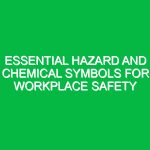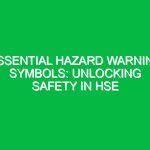Today, we are gathered here for an important Toolbox Talk on a topic that affects each and every one of us – Diet. Proper nutrition is not just about staying fit; it is crucial for our overall health, safety, and well-being in the workplace. Let’s delve into some essential tips and guidelines to ensure we are fueling our bodies right for a safe and productive work environment.
The Importance of Nutrition in the Workplace
Our diet plays a significant role in how we perform at work. Eating the right foods can boost our energy levels, improve concentration, and enhance our mood. Conversely, poor nutrition can lead to fatigue, decreased focus, and even safety hazards due to lack of alertness. By paying attention to what we eat, we can better protect ourselves and our colleagues from potential risks.
Key Aspects of a Healthy Diet
When we talk about diet in the context of Health, Safety, and Environment (HSE), we are focusing on consuming a balanced and nutritious meal plan that supports our physical and mental well-being. Here are some key aspects to consider:
- Hydration: Drinking enough water throughout the day is essential for staying hydrated and maintaining optimal bodily functions.
- Macronutrients: Ensure your meals contain a balance of carbohydrates, proteins, and healthy fats to sustain energy levels.
- Micronutrients: Vitamins and minerals are vital for various bodily functions, so include a variety of fruits and vegetables in your diet.
- Meal Timing: Eating regular, balanced meals and snacks can help regulate blood sugar levels and prevent energy crashes.
Potential Hazards of Poor Nutrition
Ignoring proper nutrition can have negative consequences on our work performance and safety. Some hazards associated with poor diet choices include:
- Decreased Alertness: Skipping meals or consuming high-sugar snacks can result in reduced focus and concentration.
- Increased Fatigue: Lack of essential nutrients can lead to fatigue, making us more prone to accidents and errors.
- Lower Immunity: A weak immune system due to poor nutrition can make us more susceptible to illnesses, impacting our attendance and productivity.
Best Practices for a Healthy Diet
To maintain a healthy diet and promote a safe workplace environment, consider implementing the following best practices:
- Plan Ahead: Prepare nutritious meals and snacks in advance to avoid relying on unhealthy options during work hours.
- Stay Mindful: Be conscious of what you eat and how it affects your energy levels and performance throughout the day.
- Encourage Healthy Options: Promote nutritious choices in the workplace, such as offering fruit instead of sugary snacks.
Regulations and Standards
While there may not be specific regulations governing individual dietary choices, it is important to adhere to any workplace policies regarding food safety, hygiene, and communal eating areas. By following these guidelines, we can ensure a clean and safe environment for all employees.
Conclusion
As we conclude this Toolbox Talk on Nutrition Tips for a Healthy Workplace, remember that our diet directly impacts our health, safety, and overall performance at work. By making informed choices about what we eat, we can create a safer and more productive environment for everyone. Let’s commit to prioritizing our nutrition and well-being each day. Thank you for your attention and dedication to maintaining a healthy workplace!


